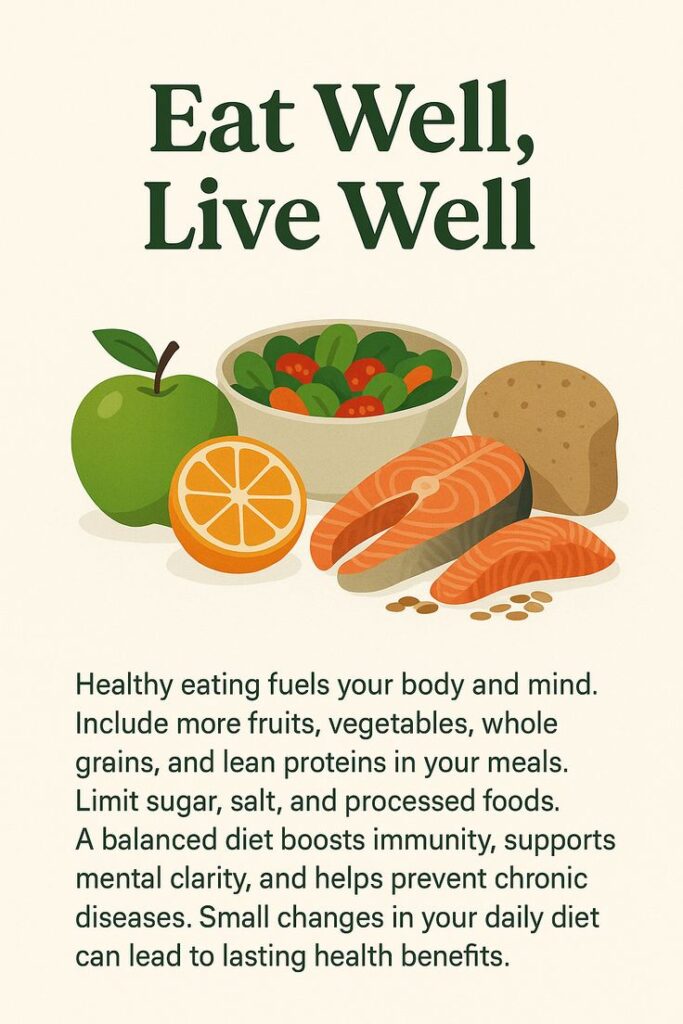
In a world that moves fast and demands more every day, taking care of your mental health isn’t a luxury—it’s a necessity. While occasional self-care days are helpful, it’s the small, consistent habits that make the most powerful difference in maintaining emotional and psychological wellness over time.
This blog explores 10 simple yet effective daily habits that can help build resilience, reduce anxiety, and promote lasting mental health wellness. These aren’t quick fixes; they are long-term strategies to help you thrive.
1. Start Your Day with Mindfulness
How you begin your morning often sets the tone for the rest of your day. Practicing mindfulness in the first few moments after you wake up can help you feel grounded, focused, and calm.
Try this:
Begin with 5 minutes of deep breathing. Observe your thoughts without judgment. Use apps like Headspace or Insight Timer for guided meditation.
Benefits:
Mindfulness reduces cortisol (the stress hormone), improves emotional regulation, and enhances overall mood. Just a few minutes a day can transform your mental clarity and set a positive tone for the hours ahead.
2. Maintain a Regular Sleep Schedule
Sleep is one of the most underrated pillars of mental health. Without quality rest, your brain doesn’t get the chance to reset and recharge, which can lead to emotional instability, memory issues, and poor decision-making.
Tips for better sleep hygiene:
Stick to a consistent sleep/wake schedule—even on weekends. Avoid screens at least 30 minutes before bed. Keep your bedroom cool, dark, and quiet.
Mental health connection:
Good sleep enhances mood, reduces symptoms of anxiety and depression, and supports better emotional resilience.
3. Eat Nutrient-Rich Foods
What you eat has a direct impact on your mental well-being. The brain needs essential vitamins, minerals, and nutrients to function optimally.
Mental health-boosting foods include:
Leafy greens (rich in folate and magnesium) Berries (full of antioxidants) Omega-3 fatty acids (found in walnuts, flaxseeds, and fish) Fermented foods like yogurt or kimchi (for gut-brain health)
Why it matters:
A healthy diet helps stabilize blood sugar, supports neurotransmitter function, and even reduces inflammation, all of which are linked to better mental wellness.
4. Move Your Body Daily
Exercise isn’t just for your physical health—it’s a powerful tool for emotional and mental balance. Moving your body releases endorphins, which are natural mood elevators.
No gym? No problem:
Take a 30-minute walk. Try yoga at home. Dance to your favorite music. Stretch during work breaks.
Mental health benefits:
Daily movement reduces symptoms of anxiety, improves self-esteem, and promotes deeper, more restful sleep. It also provides a natural break from overthinking or mental fatigue.
5. Practice Journaling
Writing down your thoughts is a therapeutic act. It allows you to process emotions, reduce stress, and gain insights into your inner world.
How to start:
Spend 5–10 minutes writing freely. Use prompts like: “What made me feel calm today?” “What am I grateful for right now?” “What do I need to let go of?”
Why it works:
Journaling helps reduce mental clutter, organize thoughts, and promote self-awareness. It’s a private space for your mind to breathe and reflect.
6. Take Breaks from Screens
Constant exposure to digital devices can overstimulate your brain, disrupt sleep, and contribute to anxiety and attention fatigue.
Create tech-free moments:
One hour of screen-free time before bed No phones during meals Set social media limits using built-in app timers
The benefit:
Stepping away from screens reduces information overload and helps you reconnect with the present moment. It also improves focus, creativity, and interpersonal relationships.
7. Connect with a Loved One
Humans are social creatures, and meaningful connections are essential for mental health. Even brief interactions can elevate mood and reduce feelings of isolation.
Ideas to stay connected:
Call or text a friend or family member Plan a weekly catch-up over coffee or video chat Join a community group or support circle
Mental wellness boost:
Social connection releases oxytocin, a hormone that reduces stress and increases happiness. Genuine conversations also remind us that we’re not alone.
8. Set Healthy Boundaries
Setting boundaries is about knowing your limits and protecting your time, energy, and emotional space. It’s a form of self-respect that reduces burnout and resentment.
Practical boundary examples:
“I don’t respond to work messages after 7 PM.” “I can’t take on another project right now.” “I need time alone to recharge.”
Why it’s vital:
Boundaries help you avoid emotional exhaustion and create more balance in your relationships and responsibilities. They also improve self-esteem by reinforcing that your needs matter.
9. Practice Gratitude
Gratitude shifts your focus from what’s lacking to what’s abundant. This small daily habit can retrain your brain to see the positives more clearly.

Easy gratitude practices:
Write down 3 things you’re grateful for each morning or night Share something positive with a friend Keep a gratitude jar and add to it regularly
Mental health impact:
Gratitude increases happiness, reduces symptoms of depression, and builds emotional resilience. It teaches the mind to focus on joy, no matter how small.
10. Reflect and Reset Before Bed
Winding down intentionally at night can help calm your nervous system and prepare your mind for restful sleep. This is also a good time for reflection and letting go.
Evening routine ideas:
Light journaling or reading Deep breathing or a warm bath Listening to calming music or nature sounds Mentally “close” the day by acknowledging what went well
Why it works:
This helps release the mental buildup from the day, reduces overthinking, and strengthens your overall mental clarity and peace.
Conclusion: Mental Health Is Built Through Consistency
Improving your mental health doesn’t require dramatic changes or expensive tools—it begins with small, intentional steps repeated daily. These 10 habits are more than wellness tips—they’re foundations for a more peaceful, resilient life.
You don’t need to adopt all of them at once. Start with two or three that resonate with you the most. As these become part of your routine, gradually incorporate more.
💡 Final Thought:
Your mental health is not a destination—it’s a daily practice. With consistency, compassion, and awareness, you can build a life where wellness isn’t a goal, but a way of living.
